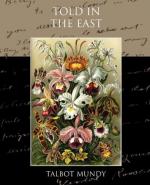“All, then, for England!” he exclaimed.
“Nay, all for thee!” said his eldest-born. “We fight on whichever side thou sayest!”
“Disloyal one!” growled the Risaldar with a scowl. But he grinned into his beard.
“Well, to your homes, then—but be ready!”
I.
The midnight jackals howled their discontent while heat-cracked India writhed in stuffy torment that was only one degree less than unendurable. Through the stillness and the blackness of the night came every now and then the high-pitched undulating wails of women, that no one answered-for, under that Tophet-lid of blackness, punctured by the low-hung, steel-white stars, men neither knew nor cared whose child had died. Life and hell-hot torture and indifference—all three were one.
There was no moon, nothing to make the inferno visible, except that here and there an oil lamp on some housetop glowed like a blood-spot against the blackness. It was a sensation, rather than sight or sound, that betrayed the neighborhood of thousands upon thousands of human beings, sprawling, writhing, twisting upon the roofs, in restless suffering.
There was no pity in the dry, black vault of heaven, nor in the bone-dry earth, nor in the hearts of men, during that hot weather of ’57. Men waited for the threatened wrath to come and writhed and held their tongues. And while they waited in sullen Asiatic patience, through the restless silence and the smell—the suffocating, spice-fed, filth-begotten smell of India—there ran an undercurrent of even deeper mystery than India had ever known.
Priest-ridden Hanadra, that had seen the downfall of a hundred kings, watched through heat-wearied eyes for another whelming the blood-soaked, sudden flood that was to burst the dam of servitude and rid India of her latest horde of conquerors. But eight hundred yards from where her high brick walls lifted their age-scars in the stifling reek, gun-chains jingled in a courtyard, and, sharp-clicking on age-old flagstones, rose the ring of horses’ feet.
Section Number One of a troop of Bengal Horse Artillery was waiting under arms. Sabered and grim and ready stood fifty of the finest men that England could produce, each man at his horse’s head; and blacker even than the night loomed the long twelve-pounders, in tow behind their limbers. Sometimes a trace-chain jingled as a wheel-horse twitched his flank; and sometimes a man spoke in a low voice, or a horse stamped on the pavement; but they seemed like black graven images of war-gods, half-smothered in the reeking darkness. And above them, from a window that overlooked the courtyard, shone a solitary lamp that glistened here and there upon the sleek black guns and flickered on the saber-hilts, and deepened the already dead-black atmosphere of mystery.




